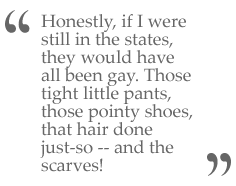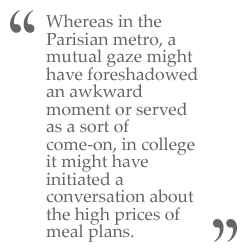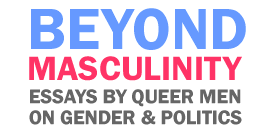|
 Which is perhaps just what some feminist scholars in the
1970s and 80s, such as Laura Mulvey, did. Building off
the ideas of Foucault and Lacan, they criticized the
fact that men control the gaze, that they do all the
looking and that women act as passive screens for their
fantasies. They argued that images of women in the media
and in pornography consistently demeaned the female
form, and that men were socialized to stare at women as
objects in order to control them and prevent them from
talking or, well, looking back. Which is perhaps just what some feminist scholars in the
1970s and 80s, such as Laura Mulvey, did. Building off
the ideas of Foucault and Lacan, they criticized the
fact that men control the gaze, that they do all the
looking and that women act as passive screens for their
fantasies. They argued that images of women in the media
and in pornography consistently demeaned the female
form, and that men were socialized to stare at women as
objects in order to control them and prevent them from
talking or, well, looking back.
Were the feminists right? To an extent, yes, but less so
as time has gone on. Certainly, the prevalence of men as
objects-to-be-seen alongside women has increased
dramatically, as exemplified in advertising and in
popular culture. In fact, where I went to school, the
men’s water polo team—and not the women’s—posted flyers
of themselves all lined up wearing speedos as a gimmick,
urging people to come to their games, presumably to see
their sexualized bodies in action. So, at least from
where I’m standing, I don’t see that men are never the
objects of the gaze.
Newer feminist critics have taken account of these
complexities. Indeed, the question has moved out of
academia and into popular culture. “The Female Gaze”
is a weblog that attempts to reverse the direction of
the classically defined male gaze, for example. But what
still often goes uncontested is the notion that the gaze
objectifies its target and empowers its owner; in other
words, watching is better than being watched. And
unfortunately, most analyses focus primarily, if not
solely, on heterosexual gazing between men and women.
Fortunately, there’s some hope for gay men in this realm
of academia. Of the few writings that talk about the
queer gaze, Brian Pranger’s work sheds some light on
what it means to be gay and looking. He writes in The
Arena of Masculinity that “gay men are able to
subtly communicate their shared worldview by a special
gaze that seems to be unique to them.” A special gaze,
huh? Sounds intriguing. He continues, “Most gay men
develop a canny ability to instantly discern from the
returned look of another man whether or not he is gay.”
Now don’t we wish! Despite his valiant attempt, Pranger
is a little too confident in the reliability of his
sources. If it were so easy to tell who was gay, we’d
never have to ask! But what’s a little more concerning,
at least to me, is that Pranger flattens the diversity
within queer populations by referring to a “shared
worldview.” What about race, class, and all the other
divisions within LGBT populations? Let’s not forget
about questioning and closeted folk. It seems like
Pranger is living and writing in a little exclusive
world of gaydom that I’ve never entered.
 Enough theory. The gay male gaze, I think, is not a
singular gaze shared by all. I certainly had no
idea where to begin when trying to identify gay men in
Paris. Honestly, if I were still in the states, they
would all have been gay to me. Those tight little pants,
those pointy shoes, that hair done just-so—and the
scarves! It just didn’t mesh with my idea of a decidedly
straight man. So as a queer, South Asian-American,
theory-loving male spending an academic quarter studying
abroad in Paris, where did all this theory and practice
put me? Enough theory. The gay male gaze, I think, is not a
singular gaze shared by all. I certainly had no
idea where to begin when trying to identify gay men in
Paris. Honestly, if I were still in the states, they
would all have been gay to me. Those tight little pants,
those pointy shoes, that hair done just-so—and the
scarves! It just didn’t mesh with my idea of a decidedly
straight man. So as a queer, South Asian-American,
theory-loving male spending an academic quarter studying
abroad in Paris, where did all this theory and practice
put me?
Despite what Foucault might have argued, I didn’t feel
that being watched would put me under a microscope,
having each crevice of my exterior scanned meticulously
until it became all there was of me. Perhaps, à la
Lacan, I was only looking for myself in the eyes of
others; but I wasn’t aiming to reduce them to
reflections, I was trying to validate my own existence.
And, apologies to the feminist scholars of yore, but I
might have preferred being treated like a passive screen
for male cat-callers over feeling like an anonymous
shadow. But, the harder I tried to believe that it
shouldn’t matter whether or not some guy’s gaze found
me, it did. The sheer lack of eye contact and connection
demoralized me after a while. Buying outlandish and
eye-catching fashions could have been the answer if I
weren’t the re-incarnation of Ebenezer Scrooge—and I
gave up on trying to feel a part of Paris.
Averting the gaze
After my stay in City of Light came to a close, I
returned to California for school and, almost
immediately, I was shocked to feel the eyes of men again
roaming my body. My god! It was like I was living in a
colony of peeping toms! And no, after my attention
drought in Paris, their stares weren’t unwelcome. But it
wasn’t totally sexual, either. At college, mutual
glimpses occur more frequently partly because students
often know each other or share assumptions about who we
are—it’s hard to be perfectly anonymous on an insular
campus, what with the advent of social networking
websites like Facebook and Myspace.
 Back at school in California, I reaffirmed the suspicion
that the gaze works differently, and means differently,
in varying contexts for all these reasons (density,
culture, familiarity). Whereas in the Parisian metro, a
mutual gaze might have foreshadowed an awkward moment or
served as a sort of come-on, in college it might have
initiated a conversation about the high prices of meal
plans. And when a look is sexual on campus, it’s
not quite as easy to tell as it seemed in Paris. Back at school in California, I reaffirmed the suspicion
that the gaze works differently, and means differently,
in varying contexts for all these reasons (density,
culture, familiarity). Whereas in the Parisian metro, a
mutual gaze might have foreshadowed an awkward moment or
served as a sort of come-on, in college it might have
initiated a conversation about the high prices of meal
plans. And when a look is sexual on campus, it’s
not quite as easy to tell as it seemed in Paris.
Given the difference in the meaning of the gaze in these
two places, you’d expect me to behave differently in
both settings. And you’d be right. Being invisible in
Paris made me want to stare (conspicuously, even) at
everyone who I found attractive, if only to see if they
would react. On campus, though, things are different. As
a rule of thumb, I won’t stare at conspicuously pretty
(or, at least, “legally blonde” pretty) girls because I
do not want to seem like the straight male jerk. It is
perhaps a perk of being gay that I am not stunned by
their charms. Another rule of thumb, more difficult to
follow, is the no-staring-at-shirtless-men-in-the-dorm
rule. I don’t care who they are, if their door is open
and their chest is bare, then I won’t look at them –
even if they’re looking at me. Yeah, maybe I’ll throw a
glance in their direction if their back is turned, or if
their gaze is reliably averted. But for some reason, I
will not stare at them if they are looking back... (continue reading)
|




7 COMMENTS ON THIS ESSAY:
Thank you for writing about my blog and for linking to it.
That was a very thought-provoking article and parts of it definitely rang true for me as a gay man taking feminist classes. Thank you.
excellent article that rings true for me in so many ways. thanks for writing it.
I've read about 70% of the essays here, and this is my favourite due to its academic & philosophical basis.
Meaningful and precise reading about gaze and objectification is hard to find. Texts on gaze/objectification (=G/O) may be interesting but are often inspirational discourses without scientific foundation. Comforting warm air with good intention.
What we need is personal and societal development towards personal and mutual insight, accept, trust, sharing, UNDERSTANDING, knowledge, wisdom and compassion. (Yes, there is buddhist inspiration here.)
The fortune of UNDERSTANDING:
The simple truth "It's all in the mind" makes good foundation for a progressive awareness of a G/O process. We need have both the freedom and responsibility to remember that our impressions, perceptions, thoughts, (re)actions are ultimately our own choices.
Most will easily agree that (re)actions should better reflect informed choices rather than be rushed or instinctual. Few however trust that also impression, perception and thought are actually "chosen" options. If however you accept the fact that "society" somewhat conditions your impression, perception and thought, you're already halfway towards realizing that they ultimately rest on personal choices - however petrified the current pattern of impression, perception and thought appears to be - in a person or within a group.
Keep this in mind always and everywhere. Read this once again perhaps. All in the mind and all own choice.
Use this essence as guide to walking the fine line BETWEEN mindfully experiencing visual impression - AND - experiencing the thoughts and emotions appearing after. Perfection here includes seeing your rising desire. Then come thoughts and mental reflections. The sequences of your mind. You may feel insecurity? Fear of upsetting the object perhaps? Rejection? Stop for a moment!
Remember it's all in the mind. Our minds may stick looping endlessly in the warm air of mental imaginery - or just plain ignorance. Stupidity actually. Invalidated by habit and influenced by others without clear insight we need to look at the root. Our choice.
Choose between seeing and labeling. Between experience and expression. Between sharing and demanding. Between feeling and craving. Between loving and being loved.
Mr. Dorm Hunk is your label. It's your eyes that facilitate your visual impression. Your mind experiences your pleasure, desire, insecurity, fear and so on. Please cleverly separate and understand these ingredients and assume full responsibility for applying your awareness.
The visual impression may induce pleasure. You may stop and just enjoy. Or you may not feel satisfied. You want more. A second glance. You are aware of your desire. You chose to look again. It's fear that keeps you from doing this openly. Your fear. Or perhaps consideration for the object. You imagine Mr. Hunk Dorm may suffer if noticing your signs of joy. Or become upset. All in your mind. Your informed choice remains: decide what you want and possibly act.
In this life we are endowed with senses. Some even with a bit of wisdom. Very important knowledge about good and bad. How to avoid causing suffering. How to promote peace and happiness. Few acquire peace and happiness once and for all. Most however want to contribute. Thats compassion.
Our divine human potentials are best served through recognition, trust and respect. Not through blockages, stiff conventions or by veils. Recognize, trust and respect an attraction. Feel the feeling. Let it be. Rest there. Take time. Grasping for rewards or a reaction from Mr. Hunk Dorm is compassionately better avoided. Actively offering him your loving admiration is preferable. You need to train in expanding trust and confidence. Trust that both you and Mr Dorm Hunk have wish, capacity, and responsibility to mindfully cooperate in the respectful sharing of experiences.
Trust that ultimately it's all about love. Your divine potential. His too.
Contribute with your expressions of love and appreciation - avoiding attachment or grasping for more.
Will there be disappointments? Yes.
Because you have attachment to pleasure. Not to insecurity, fear, rejection and suffering.
Something meaningful will fall into your basket. Maybe Mr. Dorm Hunk will get his experience of joy too.
While there is diversity within the GLBT community, there is also camraderie based on the similarities. I do find that there is a gaze, a technique of staring, which many gay men, at least, use to identify each other. For me, it is an almost primal signifier of somebody of the same "tribe", as it were. A sort of shibboleth.
excellent. Not only intellectually stimulating but also a very thoughtful and generous piece. Rings true for so many, myself included.